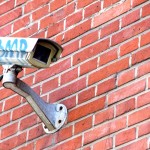Common Outdoor Security Camera Issues
Outdoor security cameras act as your first line of defense against potential burglars. The presence of outdoor security cameras alone can act as a deterrent and they can provide you with evidence should anything happen. Because they are placed outdoors, these security cameras are susceptible to possible dangers which may compromise your security system. Here are a few outdoor security camera risks and how to safeguard your security equipment.
Vandalism & Theft
Unfortunately, to cover their tracks and eliminate possible evidence, thieves may resort to vandalism and theft.
In order to protect your equipment, you will want to choose vandal-proof security cameras or CCTV cameras with metal housings or covers. These not only make it harder for them to be stolen, but they also help to keep your security camera clean.
You should also consider the placement of your security cameras. Installing outdoor security cameras where they are visible yet out of reach will help to maximize their effectiveness and reduce the risk of damage.
Lighting & Thunderstorm
Though it may seem highly unlikely, there’s still a chance your security equipment may get struck by lightning, especially in areas where thunderstorms are common.
Because metal can be highly conductive, avoid mounting your cameras to a metal. Also, be sure that your CCTV or PoE security system is grounded properly. This can minimize damage by redirecting the lightning current into the earth ground.
In addition, employing lightning surge protectors prevents voltage spikes by blocking voltage that exceeds specific thresholds and instead directing the excess into the outlet’s ground line.
Should the thunderstorm result in power outage, UPS (Uninterrupted Power Supplies) units will provide reliable backup power. They will even work if you unplug all system, cable, modem and antenna connections during a thunderstorm.
Hackers
Hacking is a big concern for network IP cameras, as hackers can possibly jam the operating device or decrypt your safety code.
In these cases, you will want to boost your network security with WPA2 (Wi-Fi Protected Access II) security protocol. You should also change your passwords frequently and make your passphrase complicated.
Firmware
In addition, updating firmware regularly for your IP security cameras is key. Some may be hesitant to perform this task as it can be inconvenient, however, these updates often contain patches for recently found loopholes or vulnerabilities that may threaten your system.
Be sure to update your firmware every few months, or check the product website to ensure you are using the latest firmware version. Also, remember to read the information carefully before upgrading.
Spider Webs or Bugs
If you employ IR security cameras outdoors and under eaves, they are likely to attract nocturnal bugs and insects that are naturally drawn to lights. Unfortunately, bugs and spider webs can compromise image quality and may even trigger false alarms from motion sensor cameras.
These issues can be combated with regular cleaning and maintenance of your outdoor security cameras. Using natural insect repellents (ex. citrus, eucalyptus, lavender, peppermint) are reported as very effective in keeping spiders away. In addition, you may use spider repellents, contact sprays, aerosol sprays and web eliminators around the camera (not directly on the lens for obvious reasons). Lastly, if you reduce the motion-detection sensibility accordingly, you will reduce false alarms.
Extreme Weather Conditions
You may worry about the performance of your security cameras if you live in areas that experience extreme and inclement weather conditions (ex. freezing winters, sweltering hot summers). Luckily, security cameras come with an IP (ingress protection) rating that determines their ability to sustain harsh weather. For example, an outdoor security camera with IP rating 66 is also known as completely water-proof (can withstand solid matter and liquid, such as dust and rainwater respectively).
Reflection Of Lights
Beware of pointing your outdoor security cameras at reflective surfaces (ex. ponds of water, glass panels, car windows) as it will cause lens glare and obstruct viewing.
To avoid this, place front door and back door security cameras outside and out of reach. Also, adjust your camera field of view to shy away from potentially reflective surfaces.
Fogging, Clouding, Or Condensation
While security cameras are often assembled to be sealed-up and air-tight to prevent moisture seeping into the lens, sudden changes in temperature may cause fogging.
This issue is common in the early morning and will sometimes go away on its own. If the problem persists, you may want to consider placing a packet of silica gel inside the housing case. Also, regularly wiping the outer lens covers with a micro-fiber cloth will help protect your cameras.
How do you maintain your outdoor surveillance system? Share your tips with us on Facebook, Google+, Twitter, LinkedIn, and Pinterest.
To shop our selection of outdoor security cameras, CCTV cameras, IP surveillance systems, and more, please visit SecurityCamExpert.com. Looking for a free quote? Call 888-203-6294 today!
Safeguard Your Security Cameras
These days, most of our devices are connected thanks to the Internet of Things. While this can make things more convenient for us, it can also leave us vulnerable to hackers.
There have been many public stories about cyber attacks and spying, from hacked baby monitors to internet outages. And while we may never see an end to cyber criminals, this proves that we can never be too cautious.
These unfortunate hacks can occur from unsecure Wi-Fi connections, open devices (no passwords), or malware attacks. Luckily, there are ways to combat attacks and minimize our risks.
Heed these cyber security tips that may apply to security cameras, webcams, as well as baby and pet monitors.
- Keep Your Internet Private
Employ a full-service security suite for your internet and keep it up to date. Use a strong, unique password and encryption to protect your network.
- Create Secure Passwords
Always change the default password that comes with your wireless networks and any of your devices. When choosing a password, remember to incorporate numbers, capital letters, and, when allowed, multiple punctuation marks. You should also try to use 12 digits, and avoid names, places, or anything that can easily be guessed. To ensure you’ve created strong and secure passwords, use a password checker.
- Keep Software Up-To-Date
As stated previously, keep all your devices and software updated as these help to patch any known or found vulnerabilities that allow hackers to gain access. Although this simple step can easily be overlooked, it is important to stay on top of these updates.
- Cover Cameras When They Are Not In Use
If your camera indicator light goes on without your permission, you can assume that your computer has been compromised. However, just because the light is off, you cannot assume that your camera is safe. Researchers have found that hackers can infiltrate and turn on webcams without activating the indicator light.
To err on the side of caution, keep your cameras covered. There are different types of patches, stickers, devices, and other products on the market that you can use. However, for an immediate fix, masking tape will suffice.
- Don’t Click That Suspicious Link!
If there is any uncertainty, do not click the link. Only download attachments or click on links from people you know and trust. If you were not expecting a message or attachment from a trusted person, be sure to check with them before opening or downloading anything.
- Avoid Using Unsecured Wi-Fi
Public Wi-Fi networks are prone to hackers so avoid them when you can.
- Check Your Camera Log
If your security system permits (most do), check the IP addresses that have accessed your cameras. If you find any suspicious IP addresses on your log, be sure to change your access codes right away and notify your security company.
- Manage Cameras Settings
Network connected security cameras allow you to remotely monitor your cameras via an app or a website. If you do not need this feature, turn it off.
- Consider A Separate Network
It may be beneficial to have one network for your phone and computers and another network solely dedicated to your security systems and other monitors.
Being an educated consumer will minimize your risk of becoming a victim. These security precautions promote safe use of personal technology and can go a long way for your cyber security. Connect with us on Facebook, Google+, Twitter, LinkedIn, and Pinterest to share your own cyber security tips.
Need quality security cameras and CCTV surveillance equipment? Look no further than SecurityCamExpert.com! Call 888-203-6294 to schedule a free* site survey, request a quote, or inquire about our installation services.

